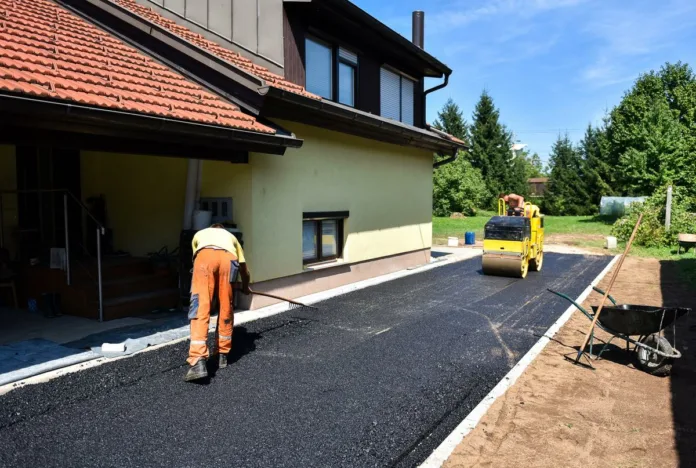A driveway is more than just a functional element of your home. It adds curb appeal, provides a safe and convenient space for your vehicles, and can even increase the value of your property. With so many different driveway materials available, how do you decide which one is right for your home? In this ultimate guide, we’ll explore the most popular driveway materials, their pros and cons, installation and maintenance considerations, and more. From concrete and asphalt to gravel and pavers, we’ll help you find the perfect match for your home and budget.
1. Concrete Driveways
A concrete driveway is a popular choice due to its durability, low maintenance, and versatile design options. Concrete can be stamped, stained, or colored to create a variety of looks, making it easy to customize the appearance of your driveway.
Pros:
– Durable and long-lasting, with a lifespan of 30+ years
– Low maintenance, requiring only occasional power washing and sealing
– Versatile design options, including stamping, staining, and coloring
Cons:
– Can be expensive, with costs ranging from $6 to $12 per square foot
– Susceptible to cracking and staining, especially in areas with extreme temperature fluctuations
– Installation can be labor-intensive and time-consuming
2. Asphalt Driveways
Asphalt is another popular driveway material due to its affordability and ease of installation. Like concrete, asphalt driveways can be durable and long-lasting when properly installed and maintained.
Pros:
– Affordable, with costs ranging from $3 to $6 per square foot
– Quick and easy installation, often taking only one to two days
– Provides a smooth, even surface that’s easy to drive and walk on
Cons:
– Limited design options, as asphalt is typically only available in black
– Requires regular maintenance, including sealing every two to five years
– Less environmentally friendly than other driveway materials
3. Gravel Driveways
Gravel driveways are an affordable and eco-friendly option that can provide a natural, rustic look for your home. They’re also easy to install and maintain, making them a popular choice for homeowners on a budget.
Pros:
– Affordable, with costs ranging from $1 to $3 per square foot
– Easy installation and low maintenance
– Eco-friendly, as gravel is a permeable material that allows water to drain through
Cons:
– Not as durable as concrete or asphalt, with a shorter lifespan of 10 to 20 years
– Can be difficult to keep neat and tidy, as gravel can shift and spread over time
– May require more frequent maintenance, such as topping up gravel and controlling weeds
4. Paver Driveways
Paver driveways consist of individual stones, bricks, or concrete pavers arranged in a specific pattern. They can create a unique, customized look for your home and are available in a wide range of colors, shapes, and sizes.
Pros:
– Highly customizable, with endless design options
– Durable and long-lasting, with a lifespan of 30+ years
– Can be easier to repair than concrete or asphalt, as individual pavers can be replaced
Cons:
– Can be expensive, with costs ranging from $10 to $25 per square foot
– Installation can be labor-intensive and time-consuming
– May require occasional maintenance, such as re-sanding paver joints or replacing damaged pavers
5. Permeable Driveways
Permeable driveways are designed to allow water to drain through the surface, reducing runoff and helping to prevent flooding. They can be made from a variety of materials, including permeable pavers, porous concrete, or permeable asphalt.
Pros:
– Environmentally friendly, as they help manage stormwater runoff
– Can be made from a variety of materials, offering design flexibility
– May qualify for local tax incentives or rebates in some areas
Cons:
– Can be more expensive than traditional driveway materials
– May require specialized installation and maintenance
– Not suitable for all climates, as they can be prone to freezing and thawing issues
6. Factors to Consider When Choosing a Driveway Material
Before deciding on a driveway material, consider the following factors:
– Budget: Determine how much you’re willing to spend on your driveway installation and maintenance.
– Climate: Choose a material that can withstand your local climate, including temperature fluctuations and precipitation levels.
– Curb appeal: Consider how the driveway material will complement your home’s exterior and the surrounding landscape.
– Maintenance: Think about how much time and effort you’re willing to invest in maintaining your driveway.
– Environmental impact: Consider the environmental impact of your chosen material, including its permeability and the resources required to produce and install it.
Conclusion
Choosing the right driveway material for your home is an important decision that can impact the appearance, functionality, and value of your property. By considering factors such as cost, durability, design options, and environmental impact, you can select a driveway material that best suits your needs and preferences. Whether you opt for a classic concrete driveway, an affordable asphalt option, or a unique paver design, a well-installed and maintained driveway can enhance your home’s curb appeal and provide a safe, convenient space for your vehicles.

